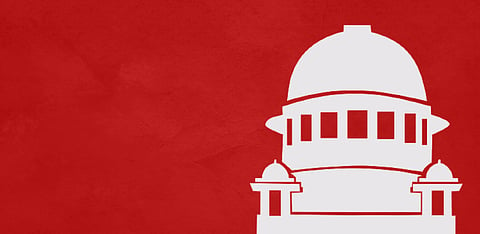

As persons with physical disabilities challenge the validity of a notification which discriminates against them in recruitment to certain services, Supreme Court agreed to let the Union Government examine the issue, keeping in view the expediency.
—–
ON Wednesday, the Supreme Court bench of justices S.Abdul Nazeer and V. Ramasubramaniam heard the counsels in National Platform for the Rights of the Disabled versus Department of Empowerment for Persons with Disabilities & Ors.
The petitioner, in this case, has challenged a notification that exempted candidates with physical disabilities, who have cleared the civil service examination, from all categories of posts in the Indian Police Service(IPS), the Indian Railways Protection Force Service (IRPFS) and the Delhi, Daman and Diu, Dadra and Nagar Haveli, Andaman and Nicobar Islands and Lakshadweep Police Service(DANIPS).
The impugned notification, dated August 18, issued by the Department of Empowerment for Persons with Disabilities, puts a blanket ban on them from the mandated 4 per cent reservation for persons with disabilities under the Rights of Persons with Disabilities Act, 2016.
Before the matter could be taken up for hearing, the Attorney General, R. Venkataramani intervened and said he would need some time to consult with the law officers about the inclusion of the differently-abled persons in the committee.
"The grievance seems to be that the differently-abled have not been in the committee…if possible we will look into the matter", he submitted.
At this point, Justice Nazeer pointed out that as per the interim orders, the indication is that 'they must' consider them positively.
The Attorney General replied and said that the court must be assured that in such matters the state has the utmost compassion and concern.
He then requested the petitioner to nominate a person to be a part of the committee to decide the plea of the petitioner.
The court accepted the submission and accorded the time for the Attorney General to examine how the differently-abled person will fit into any of the categories.
The Attorney General is also to examine how the application of the concerned persons with disabilities can be examined.
The Attorney General told the bench that the committee of medical experts have already applied their mind. But they said that if there is any room for any modification, then let it be done.
Justice Nazeer, speaking for the bench, said that they should preliminary examine certain issues and then decide. " We are not saying that they will fit into all categories." To this, Attorney General replied, "it appears that even this aspect has already been examined..but let is further be examined"
Justice Ramasubramaniam then shared an experience he had in Chennai. He said, "We appointed a 100% blind candidate as civil judge junior division. The court interpreters took him for a ride and they got all orders signed by him."
He further said, "..we had to post him as the editor of the Tamil Nadu Law Journal. He was unhappy because he wanted judicial work. We do not have a system for providing a Braille system to these people. So, the court staff played havoc in this case."
"..it's easy to argue but difficult to judge..," Justice Ramasubramaniam observed.
On a similar point, Justice Nazeer also said, "…in Karnataka, what generally happens is that there is a reservation of 2% or so in Karnataka Public Service. All those who are appointed under this category are shifted to court. And what do they do in court? They are made to sit in front of the district court as public relations officers doing nothing."
Sympathy is one aspect but practicality is another aspect, he told the counsel.
On March 25, the bench of Justices A.M Khanwilkar and Abhay S. Oka had passed an interim order, allowing the concerned candidates, such as the petitioners and similarly placed persons with physical disabilities, to provisionally apply to the Union Public Service Commission.
Initially, the court was of the view that the applications of the concerned students shall be decided in accordance with the final outcome of the petition to not disrupt the ongoing selection process in the civil services.
The then Attorney General, K.K. Venugopal, and Solicitor General Tushar Mehta had sought two weeks' time to file a reply affidavit.
However, the counsel for the petitioner, senior advocate Arvind Datar, pressed for interim relief for candidates with disabilities, who had already cleared their written examinations, as they were unable to fill up the form as the deadline date had already expired.
The bench, while granting the prayer, had found this request to be just and reasonable.